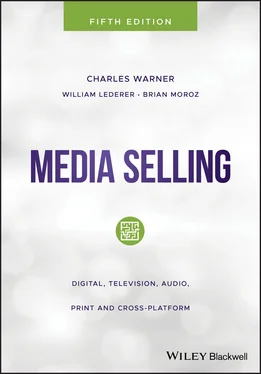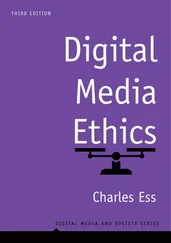Opportunities are the circumstances in which you can use your tools – attitude, skills, and knowledge. Even if you have the tools and know how to use them, you cannot accomplish anything unless you have opportunities to put them to use. Salespeople may have a positive attitude, the skills to solve problems, and a storehouse full of product, marketplace, and competitive knowledge, but if they do not make sales calls and find the right prospective customers, they will lack the opportunities to put their skills and knowledge to work.
A large part of preparation is getting organized to solve customer problems. Even if you have the attitude, emotional intelligence, skills, knowledge, and opportunities to sell, you will not solve problems or make many sales if you are not thoroughly prepared for every call and every presentation. There are two types of preparation: short term and long term. Short‐term preparation is intense, thorough preparation for every sales call, every presentation, every negotiation, and every service call. A general rule of thumb is that you should spend a minimum of two hours of preparation for every 20‐minute call or presentation, or six hours for every one‐hour call or presentation. The type of preparation required for a call or presentation involved in a typical media selling situation is covered in Chapter 9: Prospecting and Qualifying. The aphorism that “the best prepared negotiator always wins” has been attributed to former Supreme Court Justice Arthur Goldberg, and this comment holds true for negotiators, lawyers, and, certainly, salespeople. Another example of almost obsessive preparation applies to 18‐minute TED Talks, which often seem informal and off the cuff, but TED founder Chris Anderson writes in a Harvard Business Review article that, “We start helping speakers prepare their talks six months (or more) in advance so they’ll have plenty of time to practice.” 1
Therefore, depending on the situation, the amount of time to spend preparing for a one‐hour sales call or for an important formal presentation can range from six hours to six days.
On the other hand, long‐term preparation requires deliberate practice . Malcolm Gladwell’s book Outliers was number 17 on Amazon’s list of the best‐selling books of 2008. 2 Chapter Two of Outliers was titled “The 10,000‐hour rule,” and in it Gladwell wrote about the research that was done in Berlin’s elite Academy of Music in the early 1990s by three psychologists. The researchers divided the school’s violinists into three groups. In the first group were the stars – those with potential to become world‐class soloists. In the second group were those students who were judged to be merely “good,” according to the teachers at the school. The third group consisted of students who were deemed unlikely to ever play professionally. 3
All of the students in all three groups started playing at roughly the same age, around five years old. In their first several years they all practiced about the same amount, about two or three hours a week. But when the students were around the age of eight, their practice habits changed. The students who would wind up in the best group began to practice more than everyone else. They practiced six hours a week by age nine, eight hours a week by age 12, 16 hours a week by age 14, “and up and up.” 4 By the age of 20 they were practicing – “that is, purposefully and single‐mindedly playing their instruments with the intent to get better – well over thirty hours a week. In fact, by the age of twenty, the elite performers had each totaled ten thousand hours of practice.” 5 The merely good students had totaled 8,000 hours, and the third group of those judged to be unlikely to play professionally had practiced just over 4,000 hours.
All of the students were talented enough to get into the elite Berlin school. Thus, the only noticeable difference in the students was not inherent talent but the amount of time they had practiced. This research and other credible research came to the conclusion that in order to be a true expert a person has to have 10 years or 10,000 hours of practice, of preparation.
Also in 2008, another book, Talent Is Overrated: What Really Separates World‐Class Performers from Everybody Else , by Geoff Colvin referred to the same research conducted at the Berlin Academy of Music. But Colvin wrote in more detail about the ten‐years‐or‐thousand‐hours rule and not only emphasized the importance of practice in developing expert performance, but also the necessity of that practice being well structured and highly repetitive – deliberate. Colvin quoted from the seminal research article on deliberate practice, “The role of deliberate practice in the acquisition of expert performance” by K. Anders Ericsson, Ralf Th. Krampe, and Clemens Tesch‐Romer:
The theoretical framework presented in this article explains expert performance as the end result of individuals' prolonged efforts to improve performance while negotiating motivational and external constraints. In most domains of expertise, individuals begin in their childhood a regimen of effortful activities (deliberate practice) designed to optimize improvement. Individual differences, even among elite performers, are closely related to assessed amounts of deliberate practice. Many characteristics once believed to reflect innate talent are actually the result of intense practice extended for a minimum of 10 years. Analysis of expert performance provides unique evidence on the potential and limits of extreme environmental adaptation and learning. 6
Deliberate practice is characterized by the following elements: (1) Activity designed specifically to improve performance, “often with a teacher’s help;” 7 (2) an activity that can be repeated an infinite amount of time; (3) an activity on which feedback is continuously available; (4) an activity that is highly demanding mentally and physically; and (5) an activity that is not much fun. 8
Deliberate practice is specifically designed to improve performance, not on an element of performance that a person is necessarily good at or likes, but one that is necessary to achieve expertise. And that particular performance element might not be fun, which is all the better, because the person doing it has to think about executing, has to concentrate, and, therefore, the practice does not become thoughtlessly automatic.
Colvin writes: “Identifying the learning zone, which is not simple, and then forcing oneself to stay continually in it as it changes, which is even harder – these are the first and most important characteristics of deliberate practice.” 9
So, if you want to become an expert performer in media selling, you need to develop the discipline to prepare thoroughly, both short‐term preparation and long‐term preparation through deliberate practice.
Persistence means never giving up, sticking to it. Salespeople will get 10 times more “nos” than “yeses,” so persistence and grit are vital and salespeople need to continue working on prospects past any initial uninformed “no” they might encounter. Reid Hoffman, the founder of LinkedIn, a Facebook board member, and head of the venture capital fund, Greylock Partners, has a podcast titled “Masters of Scale with Reid Hoffman.” In one of his podcasts, Hoffman interviews Eric Schmidt, Chairman of Google, and he asks Schmidt what Google looks for when it hires people. Schmidt’s answer is, “Persistence is the single best predictor of future success, so we look for persistence.” 10 Google bases its hiring decisions on the analysis of massive amounts of data, so if Google has found that persistence is the single best predictor of future success, we should probably learn from Google and emphasize persistence in the AESKOPP approach to selling.
Читать дальше












